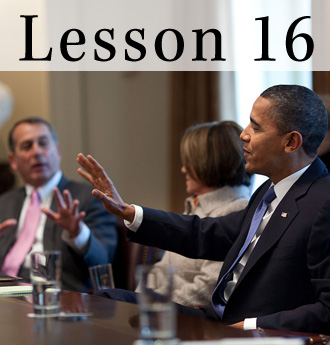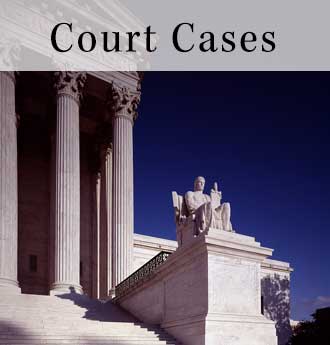Lesson 16: What Is the Role of Political Parties in the Constitutional System?
Burr, Aaron (1756-1836) Burr was a prominent public official and political leader. He served in the Continental Army, the New York Assembly, as attorney general (1789-1791), and as senator (1791-1797). He was elected as vice president in 1800. Burr killed Alexander Hamilton in a duel in 1804. He fled to South Carolina and attempted to raise an army to invade Texas and establish a republic. He was tried for treason in 1807 but was acquitted.
Hamilton, Alexander (1755-1804) Hamilton was a senior aide-de-camp to General Washington and an artillery captain during the Revolutionary War. He was a delegate from New York to the Philadelphia Convention and one of three authors of The Federalist, written to urge ratification of the U.S. Constitution. He later served as the first secretary of the treasury, put the nation's finances on a firm footing and advocated a strong national government.
Jackson, Andrew (1767-1845) Jackson was the seventh president of the United States. He was a general and hero of the War of 1812. Jackson served in the House and Senate. He had frontier origins and was seen as representative of the growing democratic spirit in the South and West. Jackson was elected president in 1828 and reelected in 1832.
Jefferson, Thomas (1743-1826) Thomas Jefferson was the third president of the United States. He was a scientist, philosopher, diplomat, and architect. He supported the revolutionary cause and served as governor of Virginia. Between June 11 and June 28, 1776, Jefferson wrote the initial draft of the Declaration of Independence, which was amended by John Adams and Benjamin Franklin and submitted to Congress. Jefferson supported the Constitution but was critical of its lack of a bill of rights. He was the first secretary of state in Washington's cabinet and the leader of the Republican Party. Jefferson was elected vice president in 1796 and was chosen president four years later. He was reelected to the presidency in 1804.
Madison, James (1751-1836) The "Father of the Constitution" was born to a wealthy Virginia family. He was taught at home and in private schools, then graduated from the College of New Jersey. While deciding whether to become a lawyer or minister, Madison became involved in the revolutionary cause, thereby entering state and local politics. His poor health kept him from serving in the military. In 1780, Madison was chosen to serve in the Continental Congress, where he played a major role. He was one of the most influential voices calling for a constitutional convention. He came to the Philadelphia Convention with a plan for the new government, took extensive notes on the proceedings, spoke more than 150 times, and worked tirelessly on various committees. As one of the authors of The Federalist, Madison was also a key figure in the battle for ratification. Following the convention, Madison served as a member of the U.S. House of Representatives, helping to frame the Bill of Rights and organize the executive department. Under Jefferson, Madison served as secretary of state. He then succeeded Jefferson as president. In retirement, Madison continued to speak out on public issues.








